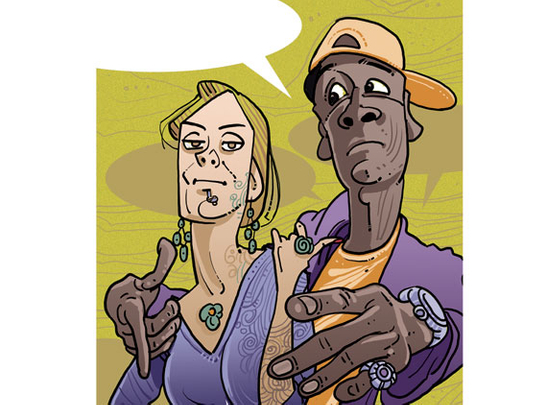
Jonathan Swift believed English needed an academy to stem the use of words such as “sham”, “banter”, “mob”, “bully” and “bamboozle”. Samuel Johnson, the great lexicographer, disliked “clever”, “fun” and “stingy”.
For centuries, English’s defenders have decried the language’s decline. Looking back, it is hard to understand why they created a fuss about words that are now part of polite speech. Sometimes the words that caused uproar, rather than being in general use, seem quaint and dated. In 1961, the “Saturday Evening Post” reported on “the lingo of youth”. Young people were calling their elders “Big Daddy”. A conventional person was a “square”. The young were telling those they liked: “I dig you the most.”
As a solitary, bookish schoolboy, Jonathon Green was tickled by outrageous words. He scoured the library for them. After school and Oxford, he began working for the underground press in late-1960s London. He helped edit the notorious publication “Oz” while its principals were dragged through the courts. Green then turned his love of slang into a career.
If you want to know the origin of “Hooray Henry” — “a rich young man given to much public exhibitionism, drunkenness and similar antisocial activities” — Green’s Dictionary of Slang, published in 2010, is the place to look. In spite of its British associations, the term was coined in America by Damon Runyon. His dictionary will also tell you that “lurgy” (“any unspecified but deleterious disease or ailment”) was dreamt up by the writers of the 1950s British radio programme “The Goon Show”.
After a lifetime writing and recording slang, Green tells us his book-producing days are over. The publishers are no longer interested.
Apparently bowing out, he has now come up with not one but two books: “Language! 500 Years of the Vulgar Tongue” and the autobiographical “Odd Job Man: Some Confessions of a Slang Lexicographer”. Both show his deep love for his subject and his ferreting out of long-lost lexicons, but you have to read both to understand what he is up to. “Language!” has depth but lacks structure. I waited for a narrative to descend; none did. “Odd Job Man” has structure (indeed, the first chapter opens with “What we need now is structure”) but has its own short-comings. It may seem odd to complain that an autobiography is solipsistic, but, after the enjoyable growing-up parts, there is too much rumination about how odd it is to be a slang lexicographer.
Green’s self-described oddness is, however, the key. Slang, he writes, is the outsider’s tongue. It is a private language the rest of the world cannot understand. Green attributes his fascination to being the only Jew at his English prep school and one of only three at his secondary. He encountered no anti-Semitism; indeed, the headmaster suggested he use his study to prepare for his bar mitzvah. But Green felt he wasn’t in the right place. Add to the sense of dislocation an adolescent’s search for books’ rude bits — sex and body parts are prodigious generators of slang — and the budding etymologist was ready to go.
Johnson insisted on keeping unpleasant words out of his dictionary. Fortunately for Green, others went looking for them. There were 19th-century word collectors such as Cornelius Crowe, a Melbourne policeman, who wrote “The Australian Slang Dictionary” containing the words and phrases of the thieving fraternity, together with the unauthorised, though popular expressions now in vogue with all classes in Australia to ensure his colleagues could understand what the miscreants were saying.
There was much interchange between the English-speaking countries. British criminals took their slang to Australia (although “cobber”, that most Australian expression of mateship, came from the Yiddish “chaver”). The First World War, and close contact in the trenches, produced more slang than any conflict before or since, including “banger” (sausage), “squiz” (look at), “whacked” (exhausted) and “put the wind up” (to frighten). After the Second World War, the spread of US television, films and music made American slang ubiquitous.
Slang is also the product of youth, which is why its supply is inexhaustible — and why older generations often fear not just for the language, but for society too. To Simon Heffer, a journalist on Britain’s “Daily Mail”, the rot set in a while back. “Especially after the 1870 Education Act in Great Britain brought reading and writing to the children of the working classes, so a language whose form had been agreed by educated people began to mutate in a fashion that lay outside that agreement,” he writes in “Simply English”. The result, he says, was “the sheer misuse of words, and the abuse of grammar”.
Heffer accepts that English words have evolved, but the completion of the first edition of the “Oxford English Dictionary” in 1928 “effectively codified the language” and unnecessary change should now cease. It is fine to introduce new terms when technological change requires it — verbs such as “text” — but, other than these, people whose words are at odds with the dictionary are simply wrong.
The “Oxford English Dictionary” does not see it that way, regarding itself as a recorder of how we use words rather than as a prescriber. On this, Heffer says, he and the great dictionary have a “serious difference of opinion”. There is no need, he says, for English grammar to alter either. It has developed over the centuries “to avoid ambiguity and to make the structure of language as logical as possible”. Having done so, “grammar should be standardised and the standard adhered to”.
Heffer does not always stick to this himself. For example, he argues that the adjective “amoral” has subtly altered in recent decades to describe “a person who has no morals” rather than something “not to be judged by a moral criterion”. He is sometimes plainly wrong, as when he describes “wet” and “dry” as absolutes like “dead” or “unique”. (He should have a word with his newspaper, which recently wrote about a spell of “wetter, windier weather”, and also that North American salamanders were becoming smaller “as their surroundings get warmer and drier”.)
There is some value in Heffer’s book. He is right about the damaging failure to teach children how to parse a sentence. It is hard to write well if you don’t understand the components of the language. Not knowing about the grammar of your own tongue makes it difficult to learn anyone else’s. And unlike some British sticklers, he is respectful of American English, pointing to its continued use of the subjunctive, largely forgotten in the UK.
But his book is pocked with snobbery. On the difference between “imply” and “infer”, he says: “The entirely uneducated have no trouble with these words because they rarely use them.” He is preoccupied to the point of parody with how to address the aristocracy. “An earl is the middle rank in the hereditary peerage, below a marquess and above a viscount. His wife is a countess. His daughters are all ladies; his sons honourable” (which invites the riposte “let others be the judges of that”).
It is with relief that we turn to Sir Ernest Gowers and his “Plain Words”, first published in 1948 and still the best book on English and how to write it. Gowers was a senior civil servant and the organiser of London’s wartime civil defence. (“If communication with the Government becomes very difficult or impossible,” Churchill told him, “it may be necessary for you to act on behalf of the Government.”) During a lull after the Blitz, he gave a humorous, morale-raising talk to civil defence workers about the awfulness of official circulars. It caught Whitehall’s attention. Gowers was asked to compile a civil-service writing manual and then a book. On the advice of a literary agent friend, Gowers insisted on a royalty rather than the proffered £500 (Dh3,078) fee. “Plain Words”, in one form or another, has been in print ever since.
Unhappy with versions rewritten by others, Rebecca Gowers, his great-granddaughter, has produced a new edition, changing the original only to eliminate obvious anachronisms such as “nay”, while updating it with her own notes. The result is splendid.
Gowers wrote with wit, humanity and common sense. Of course language changes, he said. People have always turned nouns into verbs. Shakespeare did it with “elbow” in King Lear. In Gowers’ time, some regarded the new verb “to contact” as loathsome. Gowers predicted it would survive. Among other new verbs “now nosing their way into the language” were “editorialise”, “finalise”, “hospitalise” and “publicise”. (“Decontaminate” and “dehumidify”, other controversial coinages of the time, entered the language. “Dedirt” did not.)
Gowers’ central advice should be taped to the screen of anyone sitting down at a computer keyboard: “Writing is an instrument for conveying ideas from one mind to another; your job as a writer is to make the reader grasp your meaning readily and precisely. Do you always say just what you mean? Do you yourself always know just what you mean?”
Gowers did not make a fetish of grammar. But he did say: “Lapses from what for the time being is regarded as correct, irritate readers educated to notice errors... and so make them less likely to be affected precisely as you wish.”
But what, these days, is regarded as correct? If you are in the habit of emailing “thank you for inviting Daniel and I”, you are not going to get a job with Simon Heffer. You are not going to get a job with me either. But Heffer and I have few jobs to offer. Journalism is not an expanding occupation. Designing smartphone apps is. Pop stars and footballers regularly mix up their “its” and “it’s” — and attract millions more Twitter followers and earn far bigger sums than those who know where the apostrophe goes. Heffer says that students need to know the right way to write their university applications, but a startling number of those deciding whether to admit them wouldn’t notice. And as Green points out, the reason publishers are no longer interested in his slang lexicons is that people have the online, crowd-sourced “Urban Dictionary” instead.
There are, however, still many who feel it important to write well, and to learn rules. That is why Heffer’s first book, “Strictly English”, sold well, and why this one, and others like it, will too. I would suggest you buy Gowers, but you may not want to listen to me. Deference has gone; authority is passé. Green is big enough to admit, ruefully, that his lot started all that in the 1960s.
–Financial Times
Language! 500 Years of the Vulgar Tongue, by Jonathon Green, Atlantic, RRPGBP25, 432 pages
Odd Job Man: Some Confessions of a Slang Lexicographer, by Jonathon Green, Jonathan Cape, RRPGBP17.99, 336 pages
Simply English: An A to Z of Avoidable Errors, by Simon Heffer, Random House, RRPGBP14.99, 400 pages
Plain Words, by Rebecca Gowers and Ernest Gowers, Particular, RRPGBP14.99, 320 pages







